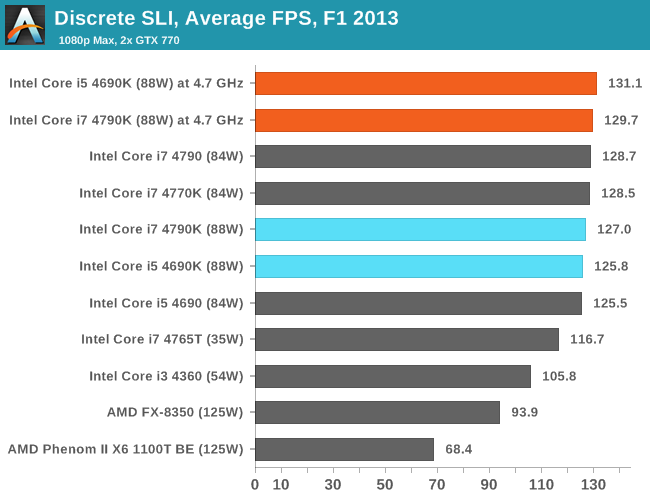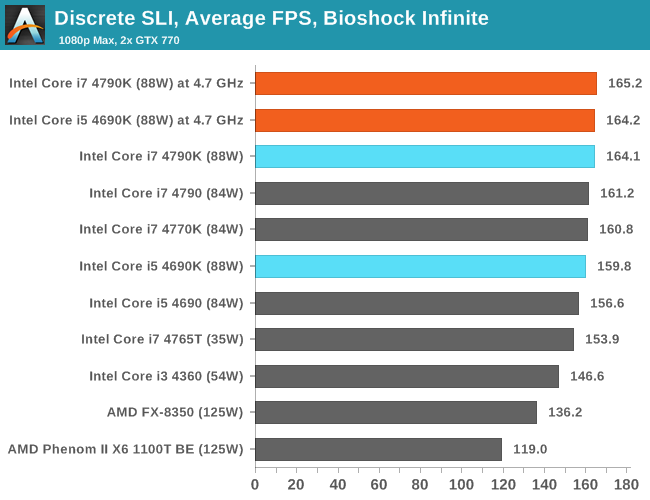Devil’s Canyon Review: Intel Core i7-4790K and i5-4690K
by Ian Cutress on July 11, 2014 10:00 AM EST- Posted in
- CPUs
- Intel
- Haswell
- i7
- Overclocking
- Devil's Canyon
- i5
- 4790K
- 4690K
Discrete GPU Gaming
When comparing CPUs to APUs, one strength shown by team Blue in the past is the discrete GPU performance. However even when using dual graphics cards at a 1920x1080p resolution, we seem to have hit a wall where extra CPU performance does not necessarily translate to more frames per second. Our results below show little difference between the Haswell processors, and we need to go down to a 2.0 GHz i7 or a 3.5 GHz i3 CPU to see a significant drop in frame rates. The biggest benefit from overclocking seems to be F1 2013 minimum frame rates.
F1 2013


Bioshock Infinite


Tomb Raider


Sleeping Dogs


Company of Heroes 2


Battlefield 4












117 Comments
View All Comments
ZeDestructor - Friday, July 11, 2014 - link
Couldn't you use something with a dedicated server combined with kb/mouse emulation on a bunch of extra PCs running at 640x480 nonsense kind of thing?It's potentially more work, especially the potential synchronisation and timing issues, but it should be doable to within 10ms of latency (on my LAN I see ping roundtrips in the sub-ms range), should it not?
Ryan Smith - Friday, July 11, 2014 - link
In theory yes. But in practice most first-person games spawn you at a random point, which makes any kind of input track playback ineffective.The games where such a thing would work would tend to be games that already have better benchmark capabilities anyhow, such as racers and RTSes.
ZeDestructor - Friday, July 11, 2014 - link
Couldn't you get a modified DS from a dev?FlushedBubblyJock - Thursday, November 20, 2014 - link
They just don't want to do it.They live for their claimed accurate scientific method.
It will take a genius with guts or a brute with some money, then we can see the results we never get that we all want somewhere else.
Let's face it, it could be done and there would be some +/- low end percentage variability, so frames could be rounded to whole numbers removing the tenths ( which are outside the current bench errors and variability ).
It just isn't going to happen here, but someone should definitely do it, and we'd all love going there.
Real life scenarios are just too scary for the cold and removed and protected elite. Politics.
We all play our online games and know what frames we can count on given our vid cards and systems and current clocks and we all have our favorite maps and servers... etc.
Remember all these websites run the highest end overlcocked cpu and boards they possibly can, and that also is deceptive for most readers.
They run SSD's now with clean installs and used to go with defragged and rebooted but now methods are equivalent so nothing extra is running best case scenario stuff...
Yes another type of review site is needed, but then again the general idea is given for what info is available here, so downsize accordingly is the answer.
wallysb01 - Sunday, July 13, 2014 - link
If this is something that’s really needed for a real test, why not just do it 50 times per processor and do some stats.doggghouse - Friday, July 11, 2014 - link
Out of curiosity, what do people consider to be safe voltages for Haswell? I recently had to replace my 4770K with a 4790K because the chip started to BSOD even when not overclocked... I don't know if I helped speed its demise after having tested it at 1.4V several times, and I think I settled on 1.3V 4.4GHz daily use (it was a mediocre chip apparently).I apparently lucked out on my 4790K because it is running stable at 4.6GHz with only 1.25V, and 4.7GHz at 1.3125V. I was thinking about testing its upper limits for fun--try for the mythical 5GHz--but I don't want to accidentally burn out an otherwise great chip. I very briefly ran it at 5GHz with 1.424V and HT disabled, it was stable enough to run a few benchmarks. But if I play around in the 1.4V range, am I potentially going to wreck it?
TheinsanegamerN - Saturday, July 12, 2014 - link
Typically, for 22nm intel (sandy bridge and haswell) the typically regarded "safe 24/7 voltage" is only 1.3 volt on air, and 1.4 volt on water. for a very short period, higher than 1.4 can be used if you have VERY good cooling, but you may damage the vhip even with ln2 cooling at anything above 1.4v.Also, it sucks you had to do 1.3v to get to 4.4Ghz....I hit 4.2Ghz at only 1.075v. apparently got a REALLY good chip somehow, although i heard that the costa rica chips, of which mine is one, always did overclock better.
doggghouse - Monday, July 14, 2014 - link
Interesting... so is it the temps, and not the voltage directly, that eventually kills the chip? If so, would running lots of synthetic benchmarks that brings temps into the 90-100C range shorten its lifespan? I have an AIO water cooler, the Kraken X60, which can keep normal temps cool, but anything above 1.25V will still hit 100C on the latest Prime95 Small FFTs test.FlushedBubblyJock - Thursday, November 20, 2014 - link
Voltage can kill the cpu. You won't necessarily get the temp reading it can happen so fast.Secondarily, a higher voltage is more volatile with higher temps, so the combination can also cause electromigration blowouts.
Dustin Sklavos - Friday, July 11, 2014 - link
"A contact at Corsair.";)
Here are the complete results for my Devil's Canyon and Pentium chips:
4790K #1: 4.7GHz @ 1.275V
4790K #2: 4.7GHz @ 1.31V
4690K #1: 4.7GHz @ 1.375V
4690K #2: 4.8GHz @ 1.375V
G3258 #1: 4.9GHz @ 1.4V
G3258 #2: 4.7GHz @ 1.375V